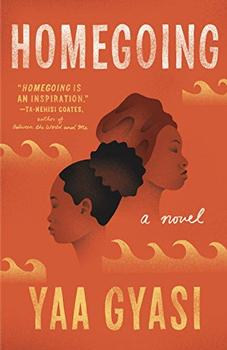Summary | Excerpt | Reading Guide | Reviews | Beyond the book | Read-Alikes | Genres & Themes | Author Bio

It's all very well to challenge people to be the masters of their own destiny, but when you're a woman in 18th-century Ghana, your birth and beauty and tribe pretty much proscribe you from indulging in such flights of fantasy. So it is that just as the young and stunning Effia Otcher from the Fanteland region is promised in marriage to a white slave trader James Collins, a match that ensures the consolidation of her family's socioeconomic status, her half-sister Esi, belonging to another tribe, is swept up in the country's booming slave trade.
This roll of the dice, beyond either's control, will have the two siblings living their lives under entirely different circumstances and on two different continents. In a series of tightly knit chapters, Homegoing chronicles each sibling's descendants over seven generations as their paths diverge and interweave in surprising ways. Effia soaks in relative affluence and her immediate family members become key power brokers in the Gold Coast slave trade, even as later relatives want to have little to do with this stain of history. While bound in chains, Esi makes her way to the Deep South in America as a slave, a fate that will dog her family, shaping it with centuries of dark history.
Yaa Gyasi, herself a Ghanaian native brought up in Alabama, knows a thing or two about how the past casts a looming shadow over the present. "This is the problem of history," she writes. "We cannot know that which we were not there to see and hear and experience for ourselves. We must rely upon the words of others...whose story do we believe?" History, as Homegoing shows, is a living, breathing, fragile thing exerting its influence and marking its presence in small but readily recognizable ways. The Jim Crow South, the Great Migration, the civil rights movement of the '60s in America and the Ashanti nation's geopolitical machinations with the British (see Beyond the Book) all play out here, but the characters are always central to the narrative. It is this focus that makes for strikingly realistic fiction — the kind that works large scale events into the quotidian details of the everyday lives of people. When Kojo, a descendant of Esi, walks up to the seafront in Baltimore during the onset of the Great Migration, for example, he finds that what once used to be a sea of black faces had "turned into nothing" and knows that he too must travel North.
To capture two continents' history over three centuries is no easy feat, and Gyasi pulls it off by assigning each generation (and therefore, each character) the responsibilities of that time's corresponding historical arc and narrative. Every chapter is deliberately and carefully tailored to move the clock forward. There are times when this method — of creating panorama by cobbling together a whole series of short vignettes — feels much too tidy and convenient a ruse. Gyasi's crisp stories are sometimes wound a little too tight, one wishes for a little slack in the reel, to linger and learn more about the characters than what their carefully crafted roles allow them room for. The sheer number of players is also occasionally daunting; the family chart included at the beginning proves to be a necessary and handy guide.
Nevertheless this marvelous debut succeeds in creating an impressive sweep by the sheer dint of powerful writing and narrative scope. "In my village we have a saying about separated sisters," Esi's mom tells her. "They are like a woman and her reflection, doomed to stay on opposite sides of the pond." An ambitious saga that moves back and forth across these "opposite sides of the pond" and weaves a rich and colorful tapestry, Homegoing is an emotionally resonant debut that hints at great things yet to come from an immensely talented storyteller.
![]() This review was originally published in The BookBrowse Review in June 2016, and has been updated for the
May 2017 edition.
Click here to go to this issue.
This review was originally published in The BookBrowse Review in June 2016, and has been updated for the
May 2017 edition.
Click here to go to this issue.

If you liked Homegoing, try these:

by Shugri Said Salh
Published 2022
"I am the last nomad. My ancestors traveled the East African desert in search of grazing land for their livestock, and the most precious resource of all - water. When they exhausted the land and the clouds disappeared from the horizon, their accumulated ancestral knowledge told them where to move next to find greener pastures. They loaded their ...

by Peace Adzo Medie
Published 2021
"Elikem married me in absentia; he did not come to our wedding."
Your guide toexceptional books
BookBrowse seeks out and recommends the best in contemporary fiction and nonfiction—books that not only engage and entertain but also deepen our understanding of ourselves and the world around us.